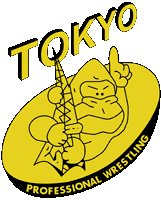Tokyo Pro Wrestling
Tokyo Pro Wrestling is the name of two unrelated Japanese professional wrestling promotions. Despite their common name, they did not share management, promotional style, or talent in any way.
 Logo of Tokyo Pro Wrestling. | |
| Acronym | TPW |
|---|---|
| Headquarters | Tokyo |
Original Tokyo Pro Wrestling
The original Tokyo Pro Wrestling operated from 1966 to 1967.
In mid-1966, Japan Wrestling Association president Michiharu Toyonobori resigned his position and left the promotion, taking along with him some talent, including Katsuhisa Shibata (father of current New Japan Pro Wrestling star Katsuyori Shibata) and the future Rusher Kimura (Masao Kimura). Antonio Inoki, who was coming back from a long excursion to the United States, chose to join him and create a new venture, Tokyo Pro Wrestling.
Tokyo Pro's biggest rising star was Inoki, who feuded with Johnny Valentine over the "United States" heavyweight title (as Valentine had held in California, Michigan and Ontario, he was "recognized" as champion by Tokyo Pro so as to lose the belt to Inoki). Inoki's feud with Valentine cemented him not only as a rising star, but also as a tough wrestler who could take on anyone, any style, anywhere.
Nevertheless, problems between Toyonobori and his business backers led him and Isao Yoshiwara to dissolve the promotion in 1967 and replace it with Kokusai Puroresu Kaisha (International Wrestling Enterprise/International Pro Wrestling), which would promote on a larger scale in Japan and eventually become the third most important men's promotion, after New Japan and All Japan, which would appear in 1972.
Tokyo Pro-Wrestling is also the place where Haruka Eigen, who was still active into his 60s wrestling for Pro Wrestling Noah, debuted. He joined Inoki and Shibata in going back to JWA.
New Tokyo Pro Wrestling
The new version of Tokyo Pro Wrestling was started by former All Japan Pro Wrestling and Super World of Sports mid-carder Takashi Ishikawa in 1994, and it was one of the many independents that arose following SWS's collapse. In 1996 they found a businessman by the name of Kotaro Ishizawa who was willing to bankroll the promotion using his bike messenger business, which enabled Ishikawa to bring foreigners, namely Abdullah the Butcher, 2 Cold Scorpio, and Sabu. It was their peak year, when they were able to hold feuds against WAR and UWFI, but economic problems relating to Kotaro Ishizawa's business' collapse sent Tokyo Pro Wrestling on a downward spiral.
The promotion was briefly reborn as Shin (New) Tokyo Pro Wrestling but remained in an even bigger obscure status. One of its top trainees, Shigeo Okumura, ended up spending more time competing for AJPW and eventually joined it in 2000, following the Pro Wrestling Noah split.